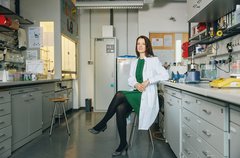Tuesday, 05 September, 2023
A matter of perseverance
Since the start of her career, Olivia Merkel has been researching methods for transporting therapeutic RNA segments precisely to their target location in the lungs. A portrait from our science magazine EINSICHTEN

While others abandoned their work on gene delivery, CeNS member Olivia Merkel accepted there would be long periods of drought. “I did not allow myself to be deterred and just kept going,” she says. Today, her results are validating her perseverance and she is glad she “always remained so stubborn.”
Breathe in, breathe out. So far, so normal. Every one of us does this approximately 23,000 times per day. With each breath, roughly two to three liters of air flow into our lungs through the bronchi and make their way into the tiniest of alveoli. By this process, the organ comes into constant contact with pathogens, chemicals, and pollutants from the ambient air. It is not surprising, then, that the disease burden of respiratory illnesses is so high.
Over a billion people worldwide suffer from acute or chronic respiratory diseases such as asthma, chronic obstructive pulmonary disease (COPD), cystic fibrosis, and lung cancer. Since the beginning of the pandemic, moreover, the number of pulmonary function disorders has substantially increased. New therapies are urgently needed, ideally non-invasive treatments without side effects. The big advantage of the lungs is that drugs can be inhaled and thus delivered directly to their site of action, without having to take a detour through the bloodstream.
This is precisely the research pursued by Olivia Merkel, Professor of Drug Delivery in the Department of Pharmacy at LMU. It is her goal to develop novel nano delivery systems for drugs against lung diseases. Merkel has been researching gene delivery for the past twenty years. In a nutshell, gene delivery is about figuring out the most effective way of carrying genes, or at least short fragments of genetic material, that can function as a drug, to their site of action – that is to say, into the diseased cells. “For a long time, people regarded my work as too remote from clinical translation,” she recalls. Acquiring funding required a lot of stamina. “Today, the topic is experiencing a veritable boom – not least because the mRNA vaccines against Covid-19 are also based on this principle.”
Merkel is fascinated by this idea and its possibilities. But the first time she entered “siRNA delivery” into the search box of a major database of all published journal articles in biomedicine, she got a paltry 12 hits. “There was just very little research in this field at the time,” explains Merkel. Quick success proved elusive in the first instance. The first (and to date one of only five) approved siRNA drug took 16 years to develop and consumed 2.5 billion US dollars. After a few years, many companies threw in the towel, research projects were dropped, and scientists went scouting for other topics to research. “I did not allow myself to be deterred and just kept going,” says Olivia Merkel with a smile.
Read the full article on the  LMU homepage.
LMU homepage.

